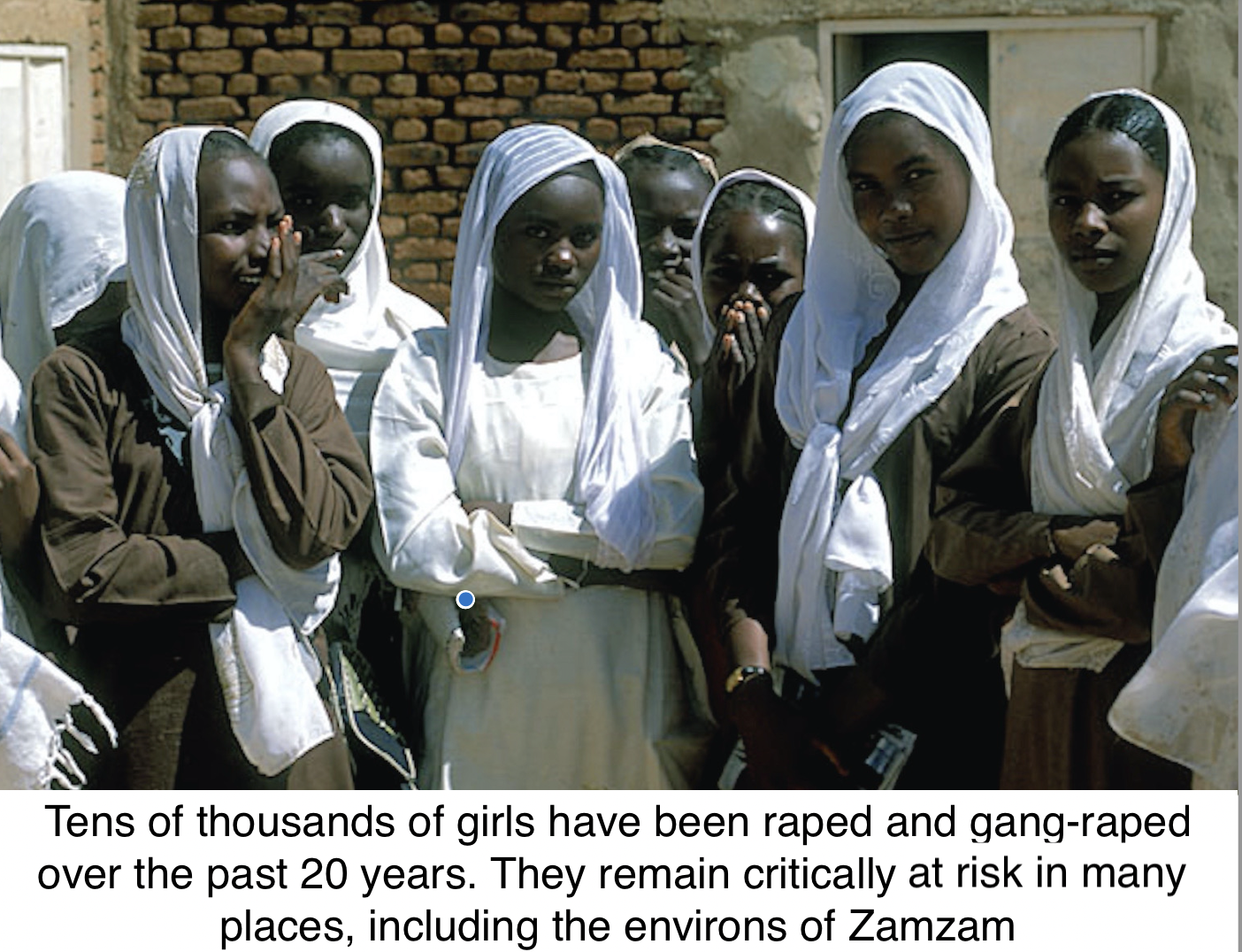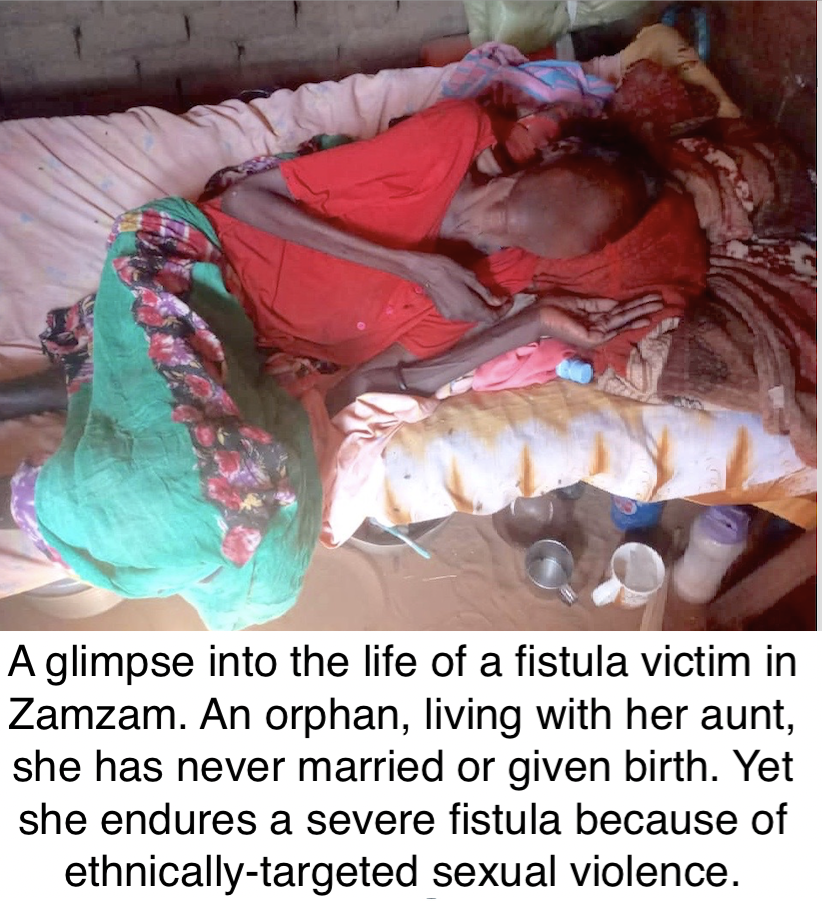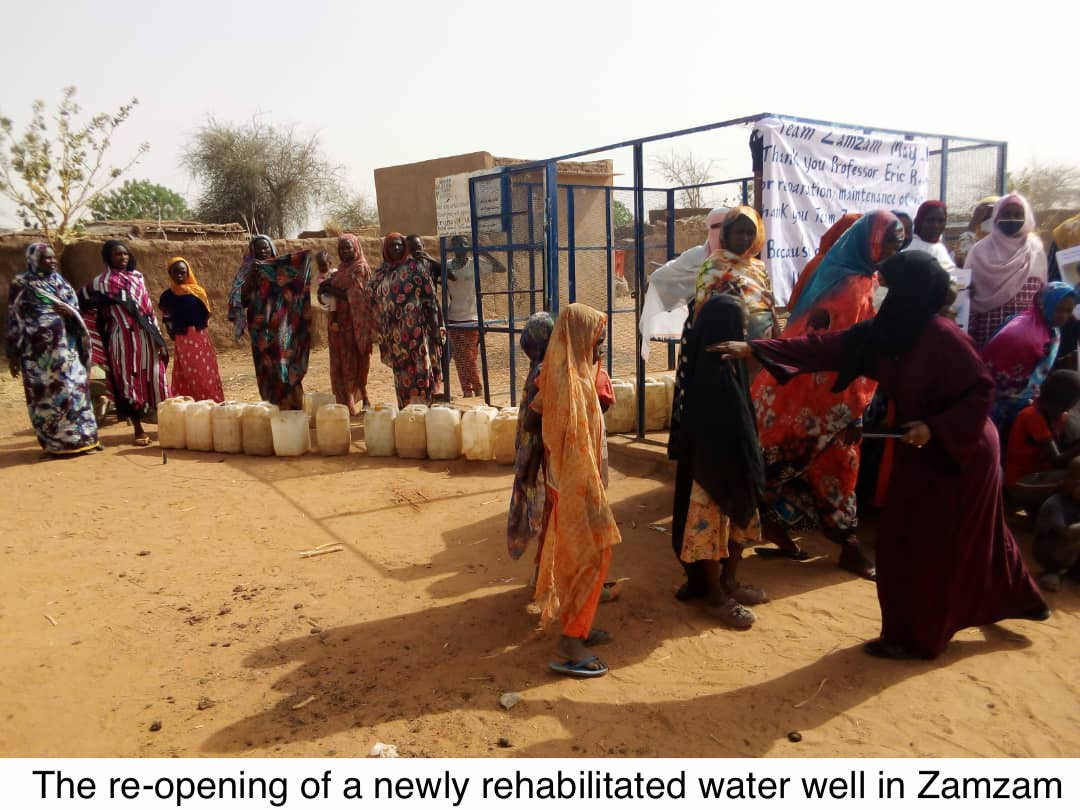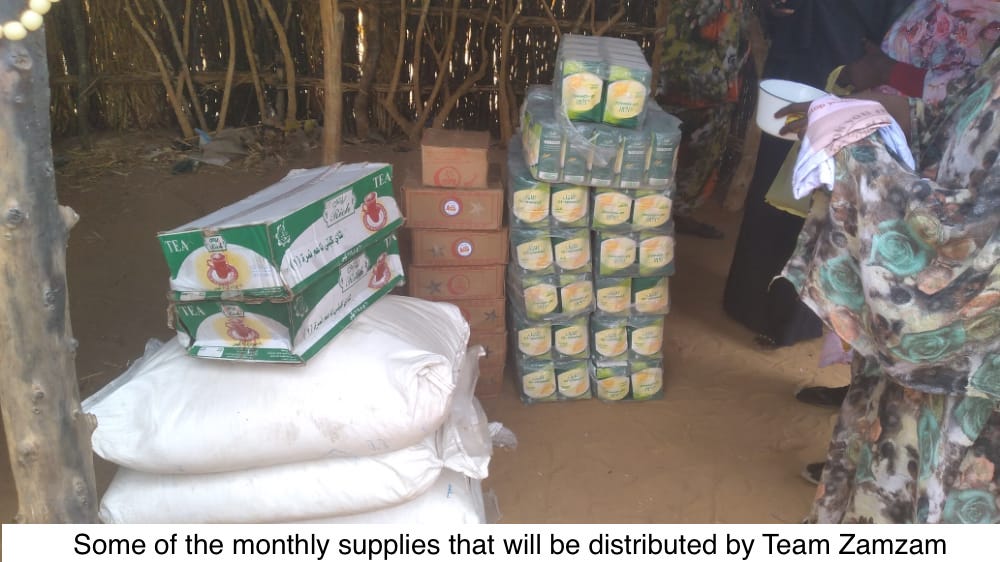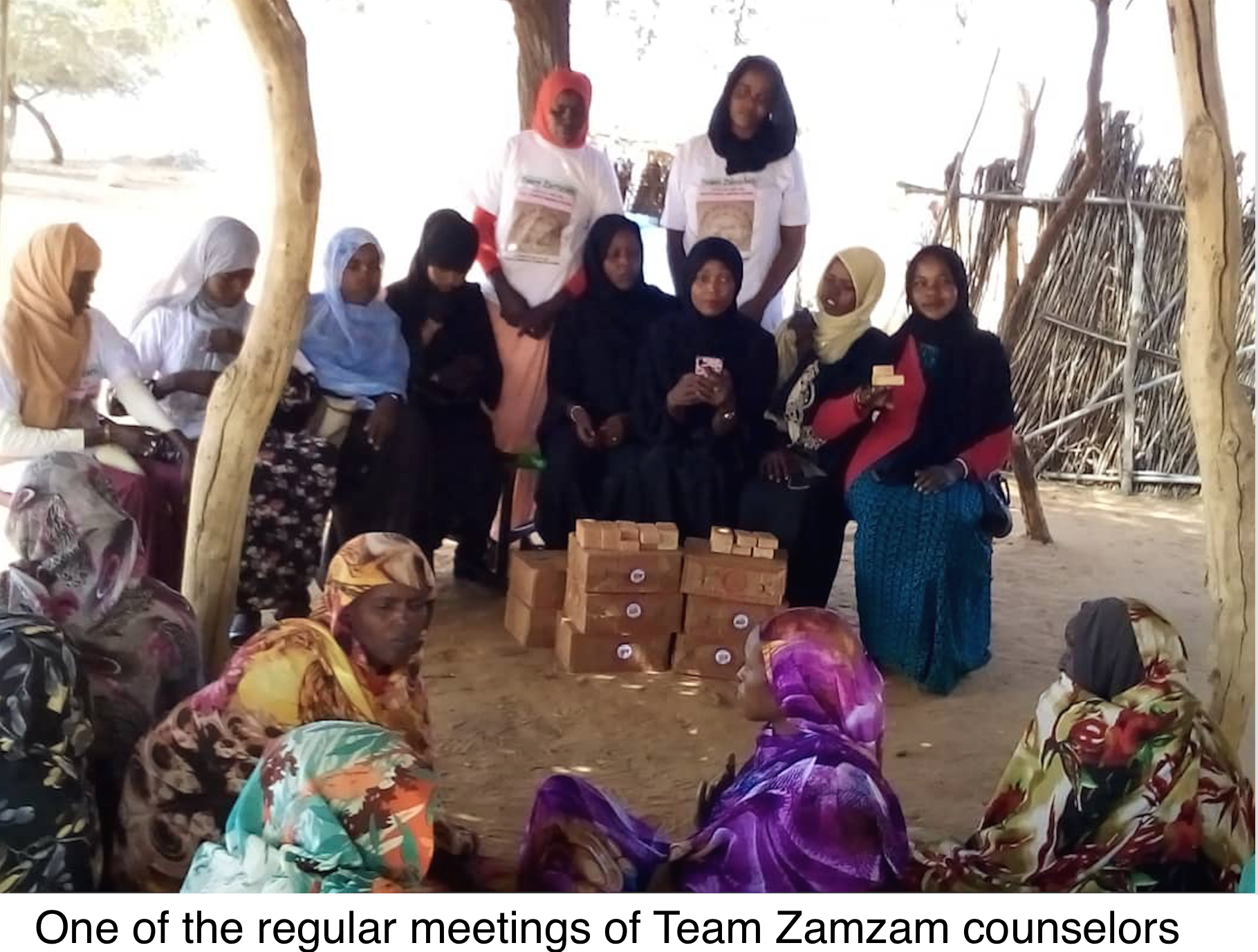Summary Report on Activities and Expenditures of Project Zamzam, January 4, 2024
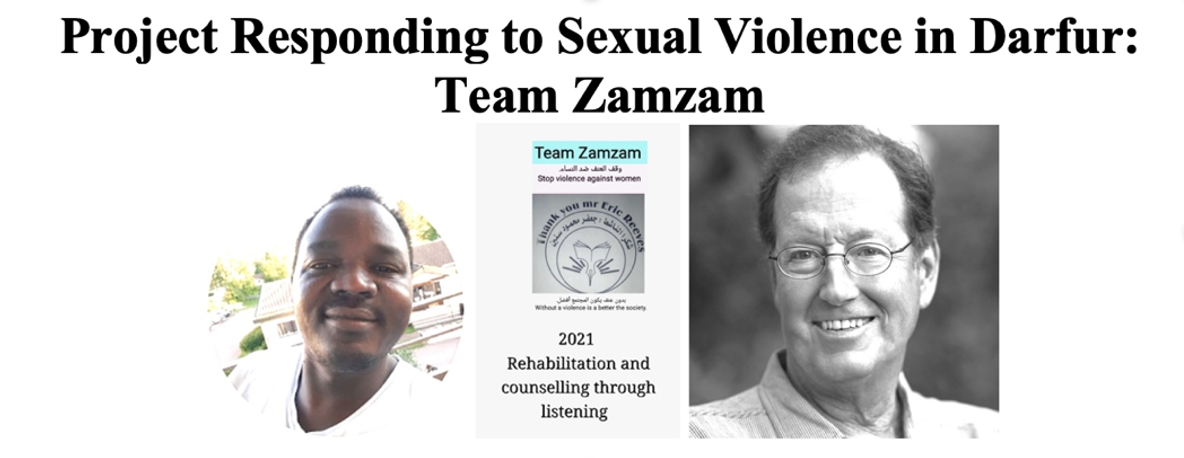 Gaffar Mohammud Saeneen and Eric Reeves, Co-Chairs
Gaffar Mohammud Saeneen and Eric Reeves, Co-Chairs
Nancy Reeves, Editor and Funding Advisor
Our project in Zamzam IDP camp, near El Fasher in North Darfur, is well into its fourth year of operation and has grown significantly in monthly funding capacity and in its scope of activities. The larger task of providing necessary humanitarian assistance to these people, many with no individual resources, is far beyond what we can undertake alone. Nonetheless, the counselors who make up “Team Zamzam” are intimately familiar with the needs of the camp and who within this vast population are neediest. (The camp has a population of well over 400,000 displaced people and their numbers continue to grow rapidly amidst current violence.)
The project continues to have as its core mission the provision of psychosocial counseling and (when possible) surgical treatment for girls and women who have been the victims of what is finally brutal, genocidal sexual violence. Virtually all those in Zamzam are from one of the non-Arab/African tribal groups in Darfur—and their attackers are the predominantly Arab militia known as the Rapid Support Forces (RSF) and their allied Arab militiamen (the various sections of the Northern Rizeigat tribe are the most notorious but are far from alone).
Our effort to respond to the needs of the many tens of thousands of girls and women who have been raped/gang-raped has had many notable successes (a number of testimonials to these successes can be found here.)
Project Zamzam has expanded with increased financial resources and now provides food and medicine to those in the most distressed circumstances. The counselors of Team Zamzam—presently 18 highly experienced women—are constantly conducting assessment missions in the four sections of this vast camp. They identify water wells desperately in need of rehabilitation, as water supplies have grown dangerously inadequate with no real international humanitarian presence other than a small Doctors Without Borders/MSF clinic in Zamzam. They escort people with urgent medical needs to El Fasher and are extremely active in the life of the camp.
What is offered here is a financial overview of the project expenditures and corresponding activities and assistance.
[For detailed Updates on Project Zamzam for 2023, please see here. Updates from earlier years are archived in the same location. The more detailed reports from the coordinating counselor of Team Zamzam have been carefully translated by Gaffar and are archived here.]
Expenditures have been tracked as carefully as possible, but the situation on the ground is simply too insecure—and communications have so often been compromised by the violence that began in April 2023—so that inevitably some estimates for expenditures on the ground in Zamzam and its environs have been necessary.
It continues to be the case that there is absolutely no overhead for this project: every dollar received goes to provide salaries for Team Zamzam counselors/workers, distribution of food and medicine to the neediest within the camp and in its environs, fistula surgeries, and the rehabilitation of water wells.
Monthly expenditures:
January 2023 $8,200. (includes rehabilitation of one water well)
February 2023 $6,000.
March 2023 $6,000.
April 2023 $8,700. (includes rehabilitation of one water well)
May 2023 $7,850. (includes purchase of electrical generator
for phones/computer)
June 2023 $6,000.
July 2023 $12,000. (includes rehabilitation of one water well/
major food supplement
August 2023 $8,000.
September 2023 $12,000. (includes rehabilitation of one water well)
October 2023 $10,000. (includes continuation of major food
supplement)
November 2023 $14,000. (includes rehabilitation of one water well,
supplemental food)
December 2023 $10,000. (includes continuation of supplemental
food distribution)
Total Annual budget: $108,750.
______________________________
Counseling sessions:
Individual sessions: Approximately 700
Group sessions: Approximately 300
Group sessions typically have between six and twelve women/girls, with two three-hour sessions, divided by a break for lunch or tea. The linguistic and cultural fluency of the counselors, along with the tremendous experience they have acquired over the past three and a half years, makes them perfect interlocutors for victims who in some cases have never spoken to anyone—even within their own families—about the terrible trauma they have experienced. Most are deeply depressed and suffering from some form of post-traumatic stress disorder (PTSD); intense feelings of shame are often exacerbated by social shunning, even by old friends.
Monthly salary total for 18 counselors and 2 male co-workers (providing assistance with distributions/transportation/unarmed security as needed) has been increased to $200/month in light of exploding prices for food and other basic goods, even as Gaffar transfers the funds to El Fasher in hard currency (euros). Given the amount of work done by Team Zamzam, and their need to feed and provide for their own families, these still modest (roughly $7.00/day) salaries are appropriate.
The annual expenditure for salaries was $48,000.
________________________________
Fistula surgeries: 33 reparative fistula surgeries were performed in 2023, although the waiting list of more than 200 girls and women remains painfully long); fistula surgeries in El Fasher clinics or hospitals cost $400/procedure. Transportation and pre- and post-operative care are provided by Team Zamzam. (Testimonials from girls and women who have been the beneficiaries of these life-transformative surgical repairs may be found here.)
The annual expenditure was $14,400.
________________________________
Water wells rehabilitated: Five wells @ $3,500 on average:
These wells provide clean water to many hundreds of families who previously had no ready access to clean water. Women and their children had to travel long distances by foot and wait many hours for access to a well that could provide only a minimum amount of water per visit (and which had to be carried, again on foot, back home). We have identified several water wells desperately in need of rehabilitating, and while we are planning work for one well in January, further work will depend on the funding available.
Annual expenditure on rehabilitating wells: approximately $17,600.
____________
One-time expense to purchase an electrical generator for recharging phones and keeping lines of communication open (the generator is able to charge the phones not only of Team Zamzam but others in the camp who are able to record testimonies and photograph notable events).
$2,000.
_______________________
Food distributions to the neediest and most vulnerable within the camp population and among those recently displaced to the Zamzam environs:
More than 3,500 families received significant food assistance from Project Zamzam in 2023:
The focus was on widows, orphans and families hosting orphans, people with various types of disabilities, the very elderly, and the acutely impoverished families. Typical food baskets included sugar, lentils, pasta, tea. Larger distributions were made during Ramadan and during an October 1, 2023 celebration of Team Zamzam and its supporters, organized entirely be the counselors of Team Zamzam.
Food baskets also typically included sanitizing soap.
Medical assistance: substantial supplies of medicine—chiefly antibiotics and analgesic pharmaceuticals—have been provided on an “as needed” basis throughout the year by Team Zamzam counselors. Bars of sanitizing soap are typically included with the distribution of food.
Annual expenditure on food supplies, medicine, sanitizing soap, feminine hygiene supplies: $38,000.
__________________
Other activities by Team Zamzam counselors:
Approximately 1,000 people with serious medical issues were transported to and escorted in clinics and hospitals in El Fasher.
Team Zamzam counselors conducted hundreds of assessment missions to all four sectors of Zamzam IDP camp and the rapidly increasing peripheral settlements by recently displaced persons. Some of these assessments are carried out on an emergency basis.
Team Zamzam is a leading voice in the frequent meetings within Zamzam that work to find ways of improving life and security in and around the camp.
Team Zamzam also conducted scores of health guidance workshops.
THE FUTURE
Team Zamzam is a remarkable group of skilled, dedicated, compassionate women who now work with very substantial experience in the extraordinarily difficult circumstances that define life in Zamzam IDP camp, now home to well over 400,000 displaced civilians. Many have never known a life outside the camp. They must contend—as must all girls and women in the camp—with the ongoing, indeed increasing threat of sexual violence. And despite the relative security of El Fasher—the only state capital city in Darfur that has not come forcefully under the control of the vast Rapid Support Forces (RSF) militia led by Hamdan Dagalo (aka Hemedti)—the threat of a renewed attack on El Fasher and surrounding camps is all too clear.
There is no sign that a cessation of hostilities is near—or that it would be observed by either the RSF or the Sudan Armed Forces (SAF). And yet an end to the violence is essential to the transport of humanitarian supplies from Port Sudan almost 1,000 miles to Darfur in the west of Sudan. Presently food is trickling into the region by alternative routes, but this is only a stop-gap measure. Farmers must feel safe when they return to their farms during the next planting season or 2024 will be yet another year of massive agricultural failure.
Team Zamzam has proved extraordinarily adept in securing what food and medical supplies are available to them and directing these resources to the neediest. Their counseling efforts have changed for the better, often dramatically, the lives of more than 6,000 girls and women over the past three and a half years. They are one of the most important voices in decision-making within the camp. They work extremely hard, bear witness where no journalists or human rights reporting exists; and they find immense gratification in their work and new-found status. Theirs is a beautiful camaraderie.
Their work will continue in 2024, but the present budget of $10,000 per month is unsustainable without greater support. There have been many generous contributions that have allowed the program to operate at current levels. But reductions in services and provision of supplies will necessarily be reduced without continuing support. This support can take several forms:
[a] A direct contribution by check to Eric Reeves (Eric Reeves, 31 Franklin St, Northampton, Massachusetts, 01060
[b] A tax deductible contribution to the project through a dedicated portal on the website for Operation Broken Silence, which works in the south-central part of Sudan.
[c] Purchase of one of Eric’s woodturnings. 100% of the purchase price of every woodturning directly supports the Zamzam project.
The people of Zamzam IDP camp are and continue to be enormously grateful for the assistance provided, the more so since there is almost no other humanitarian support in the area. Morale throughout this vast concentration of more than 400,000 displaced civilians has been greatly improved by the presence of Team Zamzam. That presence convinces many that they have not been forgotten by the world outside Darfur.
